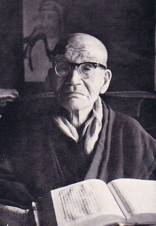Good old opinions
 |
Sawaki Rôshi:
Some opinions are also past their prime. What parents teach their children are usually these outdated opinions. "What is good is good, what is bad is bad..."
When greens are going to seed, you can not eat them any more. The same is true for our ideas: We have to see things with fresh eyes!
Often people tell us: "This is important!" But what is really important? Nothing is really important. When you die, you have to let go of everything. Even those national treasures in Kyôto or Nara will not last forever. We might as well burn them down.
Uchiyama Rôshi:
Often people tell me about the latest book written by some famous professor: "That is a good book. Did you read it?"
When I ask them though if they had understood what is written in that book, they tell me: "No, not really..."
The Japanese seem to have a very humble idea of themselves: If they read a book by a famous professor, they suppose that it must be a good book, and if they can not understand it, it must be their own fault.
Also the people who lined up all night before the book stores after the war, just to buy a copy of those really poor written philosophical works of Nishida Kitarô, must have thought that it was their own fault that they could not understand them.
Some of you might be shocked about Sawaki Rôshi's saying that we might as well burn down the national treasures. He thinks about them as follows:
Sawaki Rôshi:
For what purpose were Kinkakuji and Hôryûji and all of the other old temples all build? Certainly not for monks to practice Buddhism there. Just to raise coward monks there like cattle or sheep. Therefore, it is no surprise that there are monks who set fire to Kinkakuji or Enryakuji, and the same can be said about Ginkakuji.
